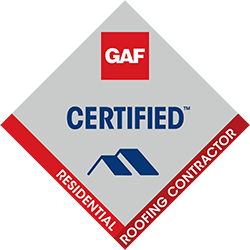Your roof is your home’s first line of defense against the elements, and its importance becomes even more evident during severe weather conditions. Whether it’s a powerful thunderstorm, heavy rain, strong winds, or even a hurricane, a strong, well-maintained roof can mean the difference between a safe, secure home and costly damage. In this blog post, Roofing Georgia explores the importance of having a durable roof during severe weather and offers tips on how to ensure your roof is ready to withstand whatever Mother Nature throws its way.
1. Protection from Wind Damage
High winds are one of the most common and destructive elements of severe weather. They can lift shingles, tear off roof sections, and expose the underlying structure to water damage. A strong roof, built with quality materials and properly installed, is essential to protecting your home from wind damage. Here’s how:
- Wind-Resistant Shingles: High-quality shingles designed to withstand strong winds can help prevent shingle loss and roof damage during storms.
- Proper Installation: A roof is only as good as its installation. Ensuring that shingles, flashing, and other components are properly secured can significantly reduce the risk of wind damage.
- Reinforced Roof Structure: For areas prone to hurricanes or tornadoes, reinforcing the roof structure with additional bracing and hurricane straps can provide extra protection against wind uplift.
By investing in a strong roof with wind-resistant features, you can minimize the risk of wind damage and protect your home’s interior from exposure to the elements.
2. Waterproofing Against Heavy Rain
Heavy rain is another major concern during severe weather, and it can quickly lead to leaks, water damage, and mold growth if your roof isn’t up to the task. A strong, well-maintained roof provides essential waterproofing that keeps water out of your home. Key factors include:
- Quality Underlayment: The underlayment is a waterproof barrier installed beneath the shingles. A high-quality underlayment helps prevent water from seeping into your home, even if shingles are damaged or blown off.
- Effective Flashing: Flashing is installed around roof penetrations, such as chimneys, vents, and skylights, to prevent water from entering these vulnerable areas. Properly installed and maintained flashing is crucial for preventing leaks.
- Gutters and Downspouts: An efficient gutter system is essential for directing rainwater away from your roof and foundation. Clogged or damaged gutters can lead to water pooling on your roof, increasing the risk of leaks.
Ensuring that your roof is properly waterproofed can prevent the costly and damaging effects of water infiltration during heavy rain.
3. Preventing Roof Collapse Under Heavy Snow or Ice
While Georgia is not known for heavy snowfall, occasional winter storms can still bring snow and ice that can put your roof to the test. A strong roof is designed to handle the weight of snow and ice, preventing dangerous situations like roof collapse. Here’s what to consider:
- Snow Load Capacity: Your roof should be built to withstand the maximum snow load expected in your area. This is particularly important for flat or low-pitched roofs, which are more prone to snow accumulation.
- Ice Dams Prevention: Ice dams occur when snow on the roof melts and refreezes at the eaves, preventing proper drainage and leading to water damage. Proper insulation and ventilation help prevent ice dams by keeping your roof at a consistent temperature.
- Regular Snow and Ice Removal: If your area experiences heavy snow, regular removal of snow and ice from the roof can prevent excessive weight buildup and reduce the risk of collapse.
Taking these precautions can help ensure that your roof remains strong and secure, even in winter weather.
4. Protecting Your Home from Debris
Severe weather often brings with it flying debris, such as tree branches, roofing materials, and other objects that can cause significant damage to your roof. A strong roof is built to withstand impacts from debris, minimizing the risk of punctures, tears, and other types of damage. Important considerations include:
- Impact-Resistant Shingles: Some shingles are designed to be more resistant to impacts from debris. These shingles can help protect your roof from damage during storms.
- Reinforced Roof Decking: A strong roof deck provides a solid foundation for your roofing materials and adds an extra layer of protection against impacts.
- Tree Maintenance: Regularly trimming trees and removing dead branches near your home can reduce the risk of debris falling on your roof during a storm.
By ensuring that your roof is built to withstand impacts, you can protect your home from potential damage caused by flying debris.
5. Ensuring Long-Term Durability
A strong roof not only protects your home during severe weather but also ensures long-term durability and peace of mind. Regular maintenance and timely repairs are key to keeping your roof in top condition, ready to face any weather challenge. Here’s what you can do:
- Regular Inspections: Schedule regular roof inspections, especially after severe weather events, to identify and address any damage before it becomes a bigger problem.
- Timely Repairs: Don’t wait to fix minor issues like missing shingles, damaged flashing, or clogged gutters. Addressing these problems promptly can prevent more serious damage down the road.
- Quality Materials: When it’s time to replace your roof, invest in high-quality materials that are designed to withstand the specific weather conditions in your area.
A well-maintained, durable roof provides essential protection for your home, giving you confidence that your home is safe no matter the weather.
Why Choose Roofing Georgia for Your Roof Protection Needs?
At Roofing Georgia, we understand the importance of a strong, reliable roof in protecting your home from severe weather. Our team of experienced professionals is dedicated to providing top-quality roofing services, from inspections and repairs to full roof replacements. We use only the best materials and techniques to ensure your roof can withstand the toughest weather conditions.
Don’t leave your home vulnerable to the elements—contact Roofing Georgia today to schedule a roof inspection and make sure your roof is ready for whatever Mother Nature has in store.








